African pygmy hedgehogs are quite sensitive to their diet. These quill balls will devour anything you offer them but fall sick right away. So, what can African pygmy hedgehogs eat?
An African pygmy hedgehog needs a rich protein source (insects, worms, small lizards, etc.). It also eats vegetables, greens, and fruits to back up any mineral deficiency. 2 to 3 tablespoons of meals every day is healthy for the pet.
Want more details? Keep reading.
Table of Contents
What Can African Pygmy Hedgehogs Eat?
Nutritionally speaking, African pygmy hedgehogs need a high-protein, low-fat diet to thrive in life. But that’s not all.
They also require a fiber source to grind down those proteins. And besides, a green or fruity treat occasionally only promotes a healthy lifestyle in our pygmy hedgies.
In short, an African pygmy hedgehog’s meal bowl comprises the following items:
- Insects and worms
- Greens and vegetables
- Fruits
You might have to add pellets and supplements to this list for your pet African pygmy hedgie. Let’s talk about each food type in detail.
Animal Protein Sources for African Pygmy Hedgehogs
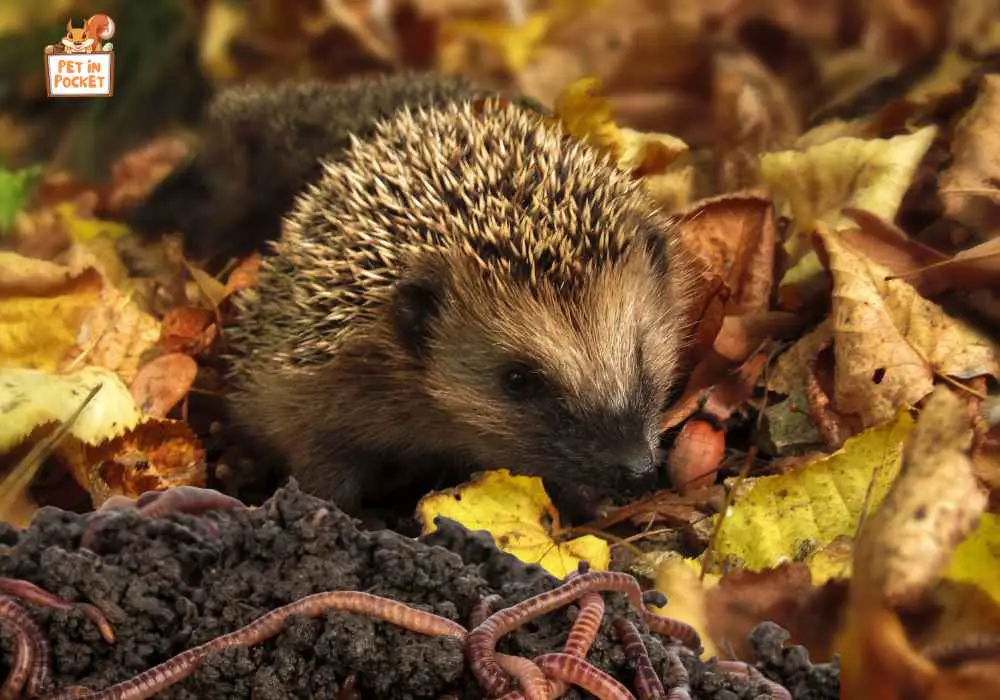
African pygmy hedgehogs are insectivores. No wonder their meals mostly consist of insects and worms. As per research, pygmy hedgies have a 30% to 50% protein and 10% to 20% fat requirement. They feast on insects and other small animals to fulfill this need.
Common protein sources for African pygmy hedgehogs are:
- Mealworms
- Superworms
- Adult beetles
- Crickets
- Earthworms
- Waxworms
- Dubia roaches
- Hornworms
- Silkworm
- Snail
- Black soldier fly
- Caterpillars
- Slug
- Grasshopper
- Maggot
- Millipedes
Hedgehogs enjoy whole animal prey instead of the dried worms. We advise offering our pygmy hedgehogs live insects, worms, and small lizards twice or thrice every week.
According to studies, hunting and feasting live prey have several benefits. Such as,
- The meal supports good gut health
- Hedgies receive a higher percentage of vitamins and minerals
- Hunting provides both physical enrichment and mental stimulation
Special Note
Wild-caught bugs can intoxicate our hedgies, ruining their immunity. We offer only farm-raised worms and insects to our pygmy hedgehogs.
Can You Feed An African Pygmy Hedgehog Meat?
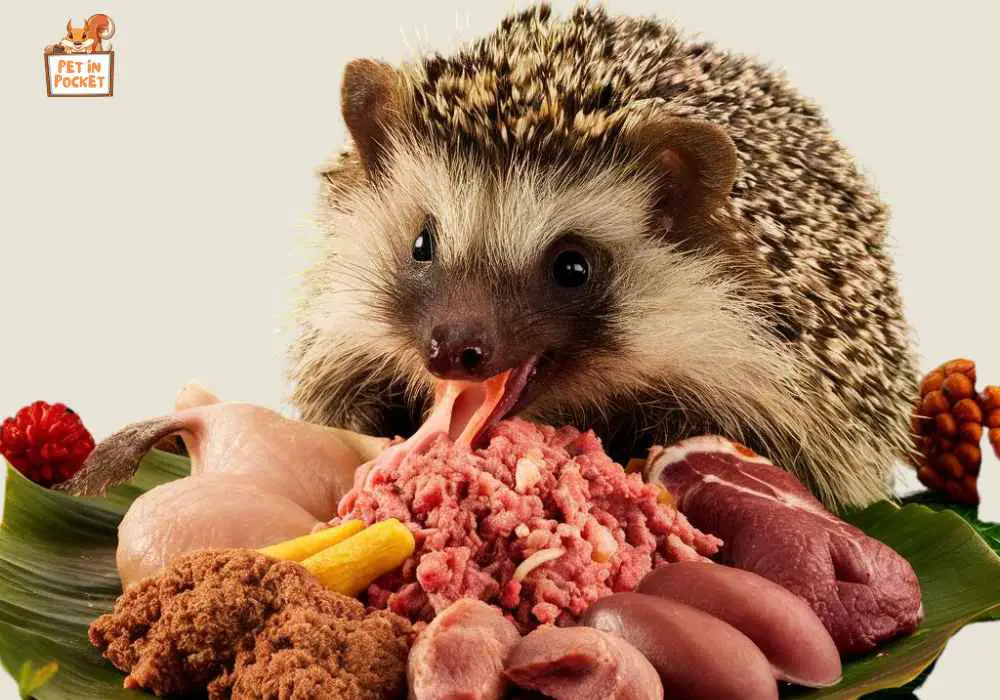
Meat of any kind can be an excellent source of high protein for our African pygmy hedgies. Safe animal proteins for these prickly pigs are,
- Chicken
- Turkey
- Lamb
- Ground beef
- Fish
- Kidney
- Liver, etc.
Preconditions of feeding the pets any meat are,
- The meat must be low in fat and high in protein.
- Never feed the hedgie raw meat.
- Cook, roast, or boil the meat without any spice and seasoning
Special Note
African pygmy hedgehogs can consume eggs occasionally. While the wild hedgies eat raw eggs, for pet quill balls, boiled eggs are more suitable.
Can African Pygmy Hedgehogs Eat Dog Food?
Surprisingly, packaged meaty cat and dog foods make amazing meals for African pygmy hedgehogs. They are high in protein and low in fat, just like the hedgies need.
However, many brands add more fat content to the meals. Remember, consuming high-fat food raises the risk of developing obesity and kidney damage in hedgehogs. Besides, they might suffer from liver damage. Experts suggest cat/ dog meals with less than 20% fat and over 30% protein are healthy for the hedgies.
Furthermore, the dog kibbles are too large for our tiny pets. They can choke to death. You must break the kibbles into smaller bite size pieces for the African pygmy hedgehogs. We usually mix two or three types of cat and dog food together to make a nutritious meal for our quill balls.
Can African Pygmy Hedgehogs Eat Pellets?
African pygmy hedgehogs can eat commercial pellets. But a pellet-based diet never ensures your pets with absolute nutrition. Hence, professionals recommend adding pellets to other protein sources. It reduces the risk of mineral deficiency.
Do African Pygmy Hedgehogs Eat Vegetables?
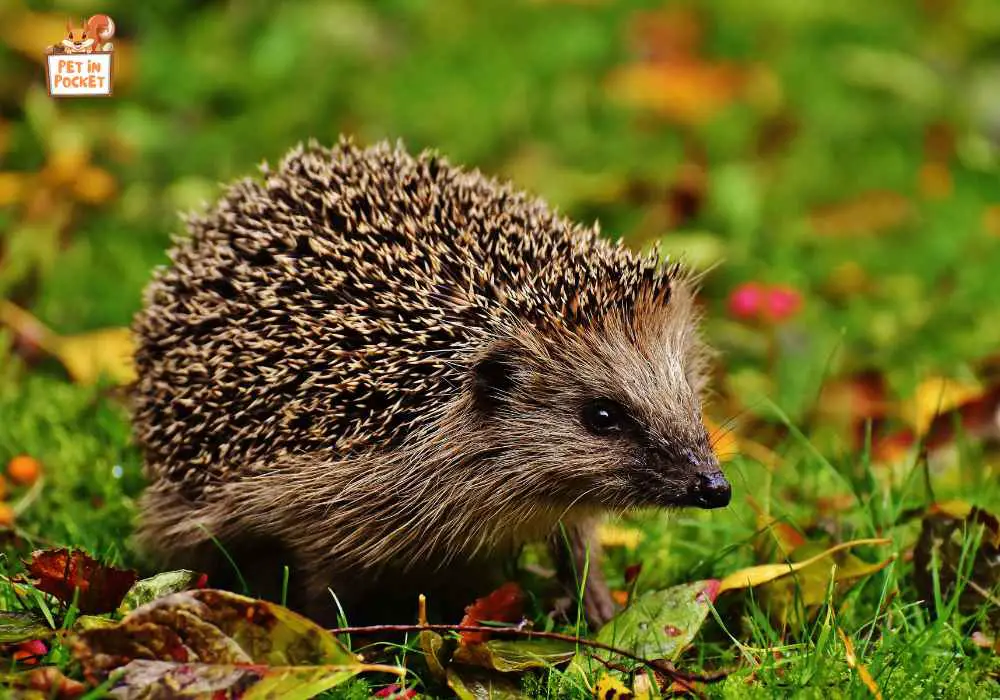
African pygmy hedgehogs need 15% fibers for their heavy protein digestion. Safe fiber sources (vegetables and greens) for our prickly balls are,
- Romaine lettuce
- Cilantro
- Peas
- Arugula
- Sprout
- Butternut squash
- Leafy greens
- Dandelion green
- Collard green
- Mustard green
- Zucchini
- Sweet potato
- Turnip
- Radis
- Asparagus
- Green pepper
- Cucumber
- Broccoli
Do African Pygmy Hedgehogs Eat Fruits?
African pygmy hedgehogs are fans of sweet fruit treats. But too much sugar can make the tiny balls suffer from nausea, vomiting, diarrhea, stomach ache and tooth decay.
Hence, professionals suggest offering the African pygmy hedgies fruits occasionally, only as treats. The safe fruit list for hedgehogs is as follows,
- Apples
- Apricot
- Cherries
- Berries
- Fig
- Kiwi
- Cantaloupe
- Bananas
- Watermelons
- Peaches
- Papaya
- Mango
- Plum
- Honeydew
- Pumpkin
- Squash
What Not to Feed Your African Pygmy Hedgehogs
Honestly, the debate will never end on what is safe and what is toxic for African pygmy hedgehogs. We have made a list totally based on our experience:
- Celery
- Spinach
- Orange
- Grape
- Coconut
- Lemon
- Lime
- Pineapple
- Dragon fruit
- Avocado
- Potato
- Carrot
- Onion
- Raw meat
- Garlic
- Raisin
- Citrus food
- Rhubarb leaf
- Corn
- Ice lettuce
- Chive
- Spicy food
- Sweet food
- Milk
- Bread
- Chocolate
- Junk food
Consuming high-starch meals with celery, potatoes, corn, etc., can cause constipation and impaction in the hedgehogs. Again, onion, garlic, and avocado includes persin, an element highly toxic for the pocket pets. As for ice lettuce, it is high in water content and leads to mineral deficiency in the hedgies.
How Often Should You Feed African Pygmy Hedgehogs?
Ideally, you should feed your African pygmy hedgehogs every day. You can either offer them food once daily or halve the quality and offer them twice a day.
Hedgies are the most hungry in the early evening when they wake up from a good sleep. They also crave food in the early morning after an active night.
How Much to Feed Your African Pygmy Hedgehogs?
We recommend feeding the hedgehog 2 to 3 tablespoons of meals every day, depending on their age and size. You should add 2 tablespoons of protein and 1 tablespoon of fruits and vegetables mixed.
Remember, African pygmy hedgies are opportunistic feeders. So, they will beg for more food even when they are full. Encouraging their actions will only push them towards obesity.
Do African Pygmy Hedgehogs Need Fresh Water?
Your pet African pygmy hedgehogs drink more water than you think. A dehydrated quill ball suffers from flaky skin, sunken eyes, and internal organ complications.
We have installed several hanging bottles in our hedgie’s cage. We replace water every day and clean the tip regularly.
How to Prepare Food for Your African Pygmy Hedgehogs?
Food preparation for African pygmy hedgehogs is comparatively easy. Here are the steps we follow:
- Hide the live insects in the substrate to add a hunting experience for the prickly pigs.
- Break the large dog kibbles into smaller pieces.
- Hedgehogs often struggle to chew the hard textured vegetables. Boiling the veggies will solve this problem.
- Cut the vegetables, leafy greens, and fruits into small pieces. Hedgies can not bite big chunks, and they might choke on the food.
- Deskin the vegetables and fruits if necessary. We also remove seeds from these items to avoid any accidents.
Special Note
Offer the African pygmy hedgehogs their meals in a shallow heavy bowl. Remove any leftovers within 4 hours. Wash the plate every day to maintain hygiene inside the cage.
Conclusion
We offer our African pygmy hedgehogs a protein-rich diet with vegetables on the side. For treats, we occasionally feed them freshly chopped fruits. Many keepers add supplements to their meals.
Supplements are not necessary if you strictly follow the diet chart. However, you can sprinkle vitamin and mineral supplements once a week on the meals to prevent malnutrition.
FAQs
Can pygmy hedgehogs eat rice?
Boiled tofu with rice is a favorite hedgehog diet. But this meal is highly unhealthy. Rice is high in carbohydrates and contains no significant minerals. Hence, there is a risk of mineral deficiency and obesity.
Are peanuts ok for hedgehogs?
We do not encourage keepers to feed nuts and seeds of any kind to their hedgehogs. Nuts are high in fat and phosphorus. Therefore, depending on a nut-based meal leads to obesity and metabolic bone disease in the hedgehogs. Moreover, contaminated peanuts can cause aflatoxicosis and liver damage in our quill balls.
Can hedgehogs eat chocolate?
Chocolates are forbidden for hedgehogs. For starters, chocolate sugar can cause tooth decay and gum infection in our spikey balls. Not to mention that cocoa can be extremely toxic to hedgehogs. The pets might suffer from vomiting, nausea, and diarrhea.
Can hedgehogs have corn?
Corn is a high-starch food. Hedgies can not process and digest starch easily. The chances are high that a corn meal will lead to indigestion, compaction, and constipation in the hedgehogs.
Can hedgehogs eat fruit juice?
Fruit juice is not suitable for hedgehogs. Juices are too high in sugar to make the hedgies sick. The pets suffer from dehydration, tooth decay, vomiting, and diarrhea if you switch to water with fruit juices. Fresh water is enough to keep the hedgehogs hydrated.

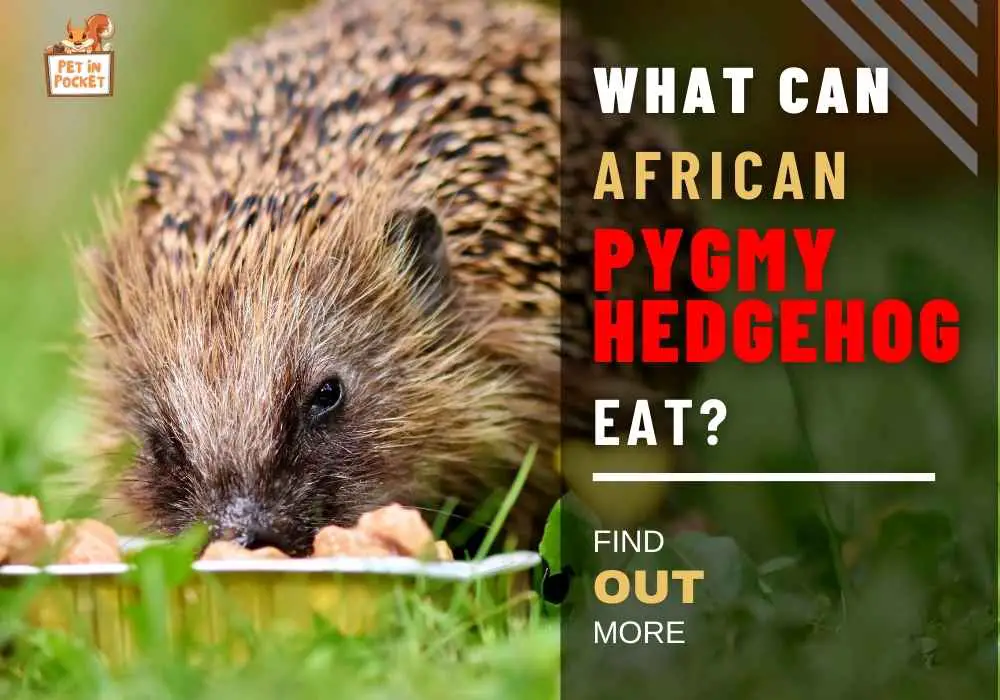



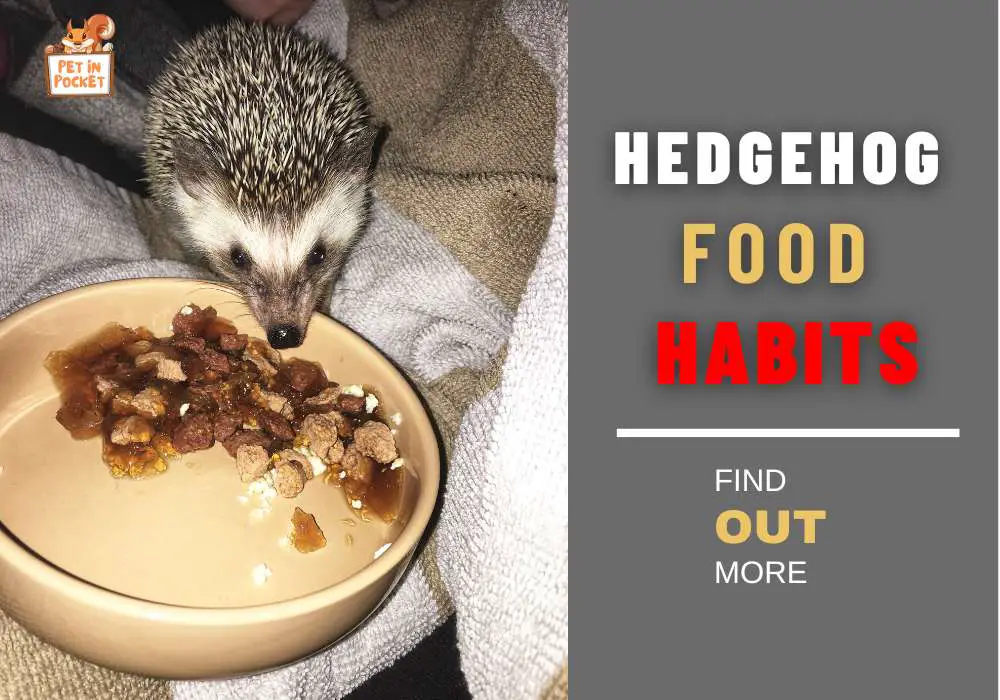
Leave a Reply